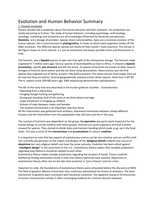Summary
Summary Evolution and Human Behavior
- Course
- Institution
> VU Honours Programme > Interdepartmental courses > Evolution and Human Behavior Bacheloropleidingen Masteropleidingen Onderwijskwaliteit Minoren Bijvakken voor studenten Opleidingsaanbod professionals Overig onderwijs Aanschuiven bij BA en MA onderwijs Cursussen voor studenten Lerarenopl...
[Show more]



